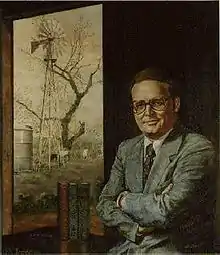Ray Marshall | |
|---|---|
 | |
| 16th United States Secretary of Labor | |
| In office January 27, 1977 – January 20, 1981 | |
| President | Jimmy Carter |
| Preceded by | William Usery Jr. |
| Succeeded by | Raymond J. Donovan |
| Personal details | |
| Born | Freddie Ray Marshall August 22, 1928 Oak Grove, Louisiana, U.S. |
| Political party | Democratic |
| Education | Hinds Community College Millsaps College (BA) Louisiana State University (MA) University of California, Berkeley (PhD) |
| Military service | |
| Allegiance | |
| Branch/service | |
| Battles/wars | World War II |
Freddie Ray Marshall (born August 22, 1928) is an American economist who is the professor emeritus and Audre and Bernard Rapoport Centennial Chair in Economics and Public Affairs at the University of Texas at Austin.
Early life and education
Marshall was born in 1928 in Oak Grove, Louisiana and had lived in an orphanage. Marshall joined the United States Navy in 1943 when he was fifteen years old and served during World War II. He earned a Bachelor of Arts degree from Millsaps College, a Master of Arts from Louisiana State University, and a PhD in economics from the University of California, Berkeley in economics. As a PhD student, Marshall's research was supervised by Walter Galenson.
Career
He has held several academic posts, but since 1962 has been at the University of Texas, with the exception of his term as United States Secretary of Labor as a member of Jimmy Carter's Administration.[1] As Secretary of Labor, he expanded public service and job-training programs, as a part of Carter's economic stimulus program. Marshall was also one of the founders of the Economic Policy Institute in 1986.
Books
- F. Ray Marshall, Labor in the South, Harvard University Press, 1967. ISBN 9780674507005.
- Ray Marshall; Marc Tucker (October 19, 1993). Thinking for a Living: Education and the Wealth of Nations. Basic Books. ISBN 978-0-465-08557-6.
- Editor: Back to Shared Prosperity: The Growing Inequality of Wealth and Income in America, ISBN 978-0765604255.

